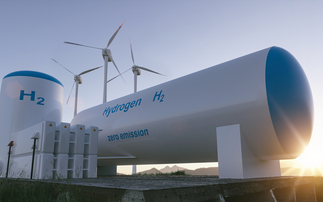National Grid's long term strategy manager, Danielle Stewart, discusses the role for hydrogen as the UK gas grid plots its path to net zero over the coming decades
As we head into the second day of the Net Zero Festival hosted this week by BusinessGreen, Danielle Stewart - long-term strategy manager at National Grid - gives her thoughts on the path to net zero for gas transmission, and what role hydrogen can play.
As a long-term strategy manager at National Grid, Stewart is responsible for plotting the path to net zero for gas transmission. Having spent 11 years in academia at the University of Warwick becoming a postdoctoral researcher and tutor, she joined National Grid over a decade ago as a network analyst in the Gas Transmission Control Room.
She's done lots of different jobs since then, from using computer modelling to advise and assist the control room on balancing supply and demand, to managing a £3bn capital investment programme. And for the past year, she's been working on a strategy to help gas reach net zero by 2050.
"Currently, 85 per cent of homes are heated by natural gas and 40 per cent of electricity is generated using gas, but this gas produces harmful carbon emissions, which is why we are exploring alternatives such as hydrogen," Stewart says.
As long as the production is decarbonised, hydrogen is much cleaner as it doesn't give off carbon when it burns - it's only by-product is water, so it has great potential when it comes to cleaner heating. And, while EVs are growing in popularity for domestic use, in the future hydrogen could be used to power freight and rail traffic.
"I spend my time investigating how we could make the switch to hydrogen," she says. "This means getting a detailed understanding of how this will affect the existing gas infrastructure and how we need to invest and innovate to help make the transition to cleaner energy. Part of my job is working alongside policymakers and the government, to inform them about what we would need to do to transition to a hydrogen network."
There is also a significant consumer element, Stewart explains. "It's vital that any change we make is as cost effective as possible, to minimise any impact on the most vulnerable people," she adds. "It also needs to cause as little disruption as possible. This is one of the reasons that we are looking into hydrogen - people are used to having gas in their homes for heating and cooking, so moving to a different, cleaner type of gas should be an easier transition."
But she also believes that there needs to be more action. "Over the last 12 months, the whole industry has been focused on the legally binding targets. That's a great start but we need to take more bold action. There are small step change decisions that can be made to accelerate the change and give investors and consumers the confidence in the direction we are taking."
BusinessGreen's Net Zero Festival will be followed by a Net Zero Skills Summit in October, looking at the skills gap and what the industry needs to do to create the Net Zero Energy Workforce needed to achieve the 2050 target.
Stewart believes that to rise to the challenge posed by climate change "we need a diverse range of people at every stage of their career to take up green collar jobs". Earlier this year, National Grid published research showing the UK will need to recruit hundreds of thousands of people into its energy sector if it is to meet its target to deliver net zero emissions by 2050.
But in order to recruit that future workforce, businesses like National Grid need to work with schools and charities to make the energy sector an attractive career choice, Stewart argues. "I have worked with a charity called Sevenoaks School Foundation and the Kent Academies Network, which together work with young people to help them overcome barriers to pursuing higher education," she explains. "They run workshops and events with university students and professionals to offer advice to these students, and I have attended them to explain my own career path. I also sit on the board of the UK Women's Infrastructure Network and mentor several people at work, as I think encouraging potential is critical at every stage of your career."
This is a contributed article from National Grid, which is a partner of the world's first Net Zero Festival taking place this week, as well as the Net Zero Skills Summit on 12 October, which you can sign up for here.







